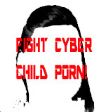
CEBU – Another form of sexual exploitation of children is rampantly rising in Cebu, paved by the advent of Internet facilities even in the poorest communities, non-government organizations working for children’s rights said.
Cyber child pornography via the Internet is rampantly spreading in the six districts of Cebu and most likely the whole country as an easy way out of poverty, according to representatives of the international children’s aid organisation Terre des Hommes Netherlands and its partners working for child rights in Cebu – the Children’s Legal Bureau, Bidlisiw Foundation and the Fellowship for Organizing Endeavours.
CLB executive director Joan Saniel said official data on children trapped in cyber child porn are still lacking, but trends show that more and more Filipino children are forced to perform sexual acts in front of the webcam while their clients, usually Western pedophiles, watch at the other end of the Internet miles away from the children.
“Cyber child porn has become more aggressive,” said Telay Echano, country coordinator of the Terres des Hommes Netherlands’ Philippine office. Easy access to Internet facilities nowadays has allowed anyone – including children – to ‘work’ at home, she said in a statement sent to the Mindanao Examiner on Tuesday.
Intermediates of the pedophiles have targeted parents, who because of easy money, let their own children and children from their community perform sexual acts in front of the webcam. Children forced into cyber child porn earn as much as P300 (EURO 6) per day posing nude and performing sexual acts in front of the webcam within their own home.
Terres des Hommes Netherlands and its Cebu partners, in response to the growing problem, launched Monday a public awareness raising campaign called “Sugbo! Lihok Batok sa Pornograpiya: Cebu-wide Day to End Child Pornography”. The launch ceremony, held at the Parkmall Cebu, gathered supporters from schools, civil society and local governments.
The campaign is the local expression of Terre des Hommes Netherlands’ Project Redirect. Terre des Hommes has launched a special project in the Netherlands to stop child exploitation in the Philippines, including prostituion and cybersex.
It aims that for every donation received from the Dutch public against child exploitation, an arrow artwork is placed in strategic parts of the street until it forms a symbolic route redirecting the children from an area of prostitution and exploitation to a Terre des Hommes Netherlands’ shelter for children.
In Schipol, Amsterdam, actor Rick Engelkes also signed Monday the first arrow of the route. The campaign in the Netherlands and Cebu kicked off simultaneously.
In Cebu, the campaign will culminate on August 1, in a gathering of anti-cyber child porn advocates, at the Plaza Independencia.
The campaign has already received support from the local governments in the province of Cebu. On July 10, the Provincial Council led by Vice Governor Agnes Magpale passed Resolution 1029-2012 in support of the campaign against cyber child porn.
“Whereas this vicious social malady that pierces the vulnerability of our innocent and (vulnerable) children has to end if we have to spare society’s moral foundation and fiber,” said in the Provincial Board resolution, urging all sectors to work together to fight the problem.
On July 11, the Cebu City Council approved a resolution, which Councilor Alvin Dizon sponsored, supporting the Cebu-wide Day to End Child Pornography on August 1.
Fighting cyber child porn needs the support of parents, schools and the whole community, says Terre des Hommes and partners.
“The psychological damage to children who are exploited in this way is very large. Children are traumatized severely. Parents are not aware of that. Educating communities is very important,” said Echano.
Pamela Uy, Bidlisiw Deputy Executive Director, says working together would help see the warning signs at once, foremost of which is letting a child pose nude in front of the webcam. “Some parents or guardians think no abuse is committed against the children because there is no actual physical contact,” Uy said.
“Most children rarely report their cases. Some are afraid while others, both children and their families, do not know that they are already being exploited,” says Jonna Bonilla-Nunez.
